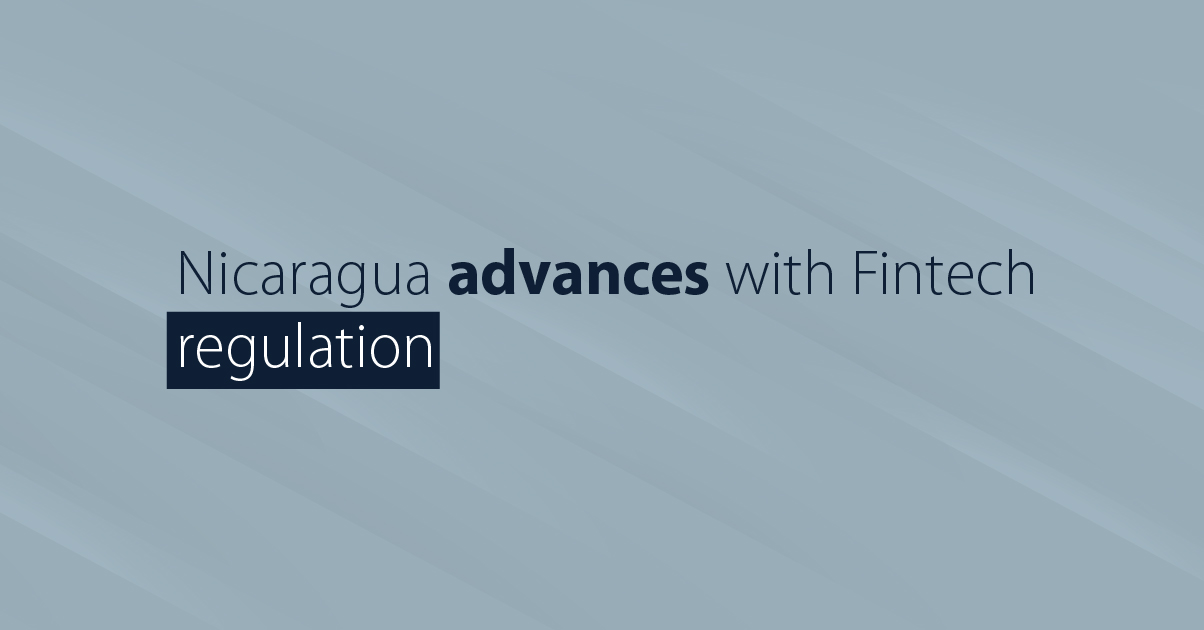Federico Barrios
Director
Nicaragua
[email protected]
Nicaragua has been regulating the application of technological tools in financial activities since, and to the extent that the local market requires the implementation of advances that allow more efficient processes in conducting operations with money.
We understand the Fintech concept as everything related to technologies that allow financial innovation, resulting in products or tools that impact the provision of financial services.
Modern history
Speaking of the last 20 years, the General Banking Law of 2005 gave financial institutions the freedom to provide payment using credit and debit cards, money transfer services, exchange houses, remittances, etc.
In 2012, regulations from the Superintendence of Banks and other Financial Institutions (SIBOIF) sought to regulate and allow the appearance of new services such as mobile wallets, electronic money, and the creation of specific companies for these services. These procedures gave way to prepaid cards and payment through cell phones and other virtual means.
After several rounds of modifications starting in 2020, the SIBOIF revoked the regulations it had issued in this regard. The Central Bank (BCN) approved specific resolutions, assuming the supervision of companies that provide means of payment services and use of electronic money, as well as remittances and currency exchange.
A new and more recent wave of regulations for financial services that use traditional and technological means to provide solutions occurred between April and June of this year. The changes in regulations are a direct result of the latest reform (Law 1072 of May 2021) to Law 977 Against Money Laundering and the General Banking Law.
This latest reform introduced concepts such as Virtual Assets and their providers or fiat currencies. Commercial banks received the power to provide virtual asset services.
Current regulation
Due to the broad impact of anti-money laundering regulations that contemplate and govern for the first time some means of payment, Law 977 and its reforms are part of the main regulatory framework of Fintech. Other BCN rules specifically govern the operating permits of companies according to their line of business and even have a protection statute for users and consumers.
Regulated companies now provide services such as payment through Financial Technology, virtual asset oversight, purchase and sale services or currency exchange, and remittance payments.
Financial Technology Providers of Payment Services (PSP) and Virtual Assets (PSAV)
The current regulation was approved in April 2022, repealing a September 2020 rule that did not regulate PSAVs. Encompassing a series of services in the concept of PSP, this regulation is one with a sphere of overall influence.
As payment services, numerous activities or facilities can serve for development and implementation; this concept is left quite open so that they reach new schemes that are not yet regulated. However, under the task of identifying seven services that immediately and automatically fall under the norm, they are digital wallets, mobile points of sale, electronic money, electronic currency trading or exchange, transfer of funds, online payment gateways, and exclusive and unique to PSAV: Virtual Assets.
Although, for the most part, conventional entities such as banks and finance companies provide these services, some other entities are making their way to offer different facilities to the market.
Providers of Services for the Sale or Exchange of Currencies and Providers of Remittance Payment Services.
In June 2022, the latest revisions to the regulations in force since the end of 2019 were published. Like their predecessors, they focus on the formalities to obtain a license or operation registration, anti-money laundering program requirements, and an infraction and sanctions module.
What is the future of Nicaraguan regulation?
The local market is not yet sufficiently developed to take full advantage of technological advances in financial matters, but some of the tools that could be implemented are:
• Alternative financing platforms such as crowdfunding, crowdlending, or P2P loans;
• Management of smart contracts (smart contracts);
• Digital Córdoba (central bank digital currency)
What is electronic money?
It is a financial instrument that represents and has backing from a national currency and allows us to make payments and transfers through electronic devices. Cash or money deposited in banks serves to acquire electronic money as an entry to electronic support generated by the provider that we can use to make transactions quickly.
What is the difference between an electronic money transfer and a money transfer through online banking?
The main difference is that to use online banking, the sender must have a bank account, and in almost all cases, the receiver must also. In an electronic money transfer, users may not be bankable subjects and still have access to means of payment and storage of funds. Electronic money is not “in” a bank account. Therefore, transactions can become more agile.
If remittances, currency trading, and exchange services are already established, why consider them Fintech?
The implementation of innovative tools helps lower costs by simplifying processes and enabling interconnection with providers of other services, facilitating access to funds for people whose only option had been the use of cash.
At BLP, we have a team that can assist you with the process. For more information, contact us at [email protected] or through WhatsApp, Telegram at +506 6280 2269.
Federico Barrios
Director
Nicaragua
[email protected]




